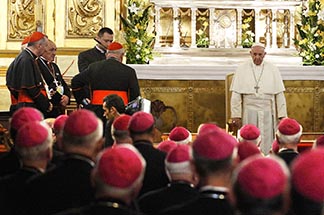Effects of overly secularized culture
Pope Francis warned Poland’s Catholic bishops that we are living in an increasingly secularized and de-Christianized culture. This has left many people orphaned, exploited and vaguely spiritual without Christ or his Church.
Sep 02, 2016

By Junno Arocho Esteves and Phyllis Zagano
Pope Francis warned Poland’s Catholic bishops that we are living in an increasingly secularized and de-Christianized culture. This has left many people orphaned, exploited and vaguely spiritual without Christ or his Church.
Speaking to the 117-member Bishops’ Conference in the Krakow Cathedral, the Pope also said that behind the exploitation of people, there is also the creation of an “ideological colonization”.
The colonization can be seen, for instance, in the promotion of “gender theory” — the idea that people choose to be male or female — which seeks to “annihilate humankind as the image of God.”
In other words, this growing ideological colonization is sinful, particularly that of gender theory, which argues that male and female characteristics are not biologically determined but are malleable social constructs.
Pope Emeritus Benedict XVI too, highlighted that all of these indicate that “we are living in an age of sin against God the Creator.”
“Today, children are taught this at school: that everyone can choose their own sex. And why do they teach this? Because the books come from those people and institutions who give money.
“God created man and woman; God created the world like this and we are doing the exact opposite,” the Pope said.
The spread of ideologies has contributed to the wars and exploitation that cause people.
“This global problem is the exploitation of creation and at the same time the exploitation of people. We are living at a time when humankind as the image of God is being annihilated.”
It was said that in 1978, on seeing newspaper photos of Louise Brown, New York’s Cardinal Terence Cooke said, “A baby!” Brown was the first “test-tube baby,” born to an English couple with the aid of a physician.
Cardinal Albino Luciani, then patriarch of Venice and soon to be Pope John Paul I, explained his similar response in detail. He said he only partly shared the excitement and enthusiasm about the baby’s birth, because to really make a judgement he would need access to all the scientific data.
Luciani went on to explain the possibilities and moral probabilities. He worried about the scientist unleashing an uncontrollable force, much like Goethe’s “sorcerer’s apprentice.” He saw the spectre of a new industry of “baby manufacturing” as he called it, and he questioned the legitimacy of the methodology, now known as in vitro fertilization.
Nothing has changed. Of course the birth of a child is a time for rejoicing. New life! What is troublesome is IVF’s continual collision with moral theology. Baby making is reduced to solitary activity in clinics, with petri dishes and sterile conditions replacing the intimacy of human love.
And the conundrum only begins there. You can’t blame the baby — or babies — resulting from these scientific advances. You can’t really blame the parents — assuming an infertile married couple is trying to create a family. The first are completely innocent. The latter are possibly invincibly ignorant — they don’t know the implications of what they are doing.
But there is too much too awfully wrong with IVF to ignore what our disposable culture has grown to accept.
The real underlying difficulty of IVF is the automatic disposal of unused fertilized embryos, whether immediately after their brothers and sisters survive implantation, or at some time in the future, when they are no longer stored in clinic freezers. There may be millions of frozen embryos. The fact is only about 10 percent of the frozen embryos will be “adopted” in procedures. The largest number of frozen embryos will eventually be destroyed.
How have we become a culture that so disregards the value of human life?







Total Comments:0